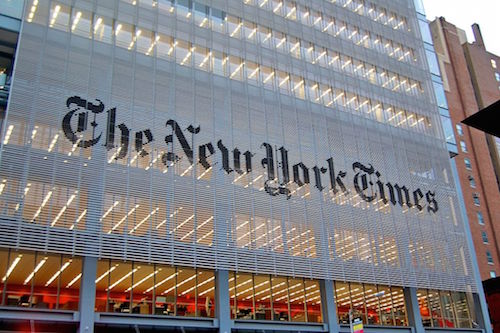 Education
Education
 Evolution
Evolution
 Free Speech
Free Speech
 Intelligent Design
Intelligent Design
 News Media
News Media
Seeking to Vilify Doubters, New York Times Now Opts for "Denier" Over "Skeptic "

The vaunted New York Times regards it as “progress” that the new standard at the paper is to refer to climate change skeptics as “deniers.” The left-wing website Media Matters interviewed Times public editor Margaret Sullivan on this:
Sullivan believes the paperis making progress when it comes to using the more accurate term “denier” — rather than “skeptic” — to refer to those who reject the scientific consensus on climate change.
In an interview with Media Matters, Sullivan described “denier” as the “stronger term” and the appropriate label “when someone is challenging established science.” Sullivan said that “the Times is moving in a good direction” on the issue, adding that the newspaper is using the term “denier” more often and “perhaps should be doing it even more.”
She also likened the discussion to the Times’ process for evaluating whether to refer to “enhanced interrogation techniques” as torture, stating: “After a long time the Times came around to calling it torture and I thought that was a very good thing. I think we’re sort of in the same realm with the business about skeptics and deniers.”
Sullivan, who briefly addressed the distinction between “skeptics” and “deniers” in her May 7 column, said she doesn’t have any immediate plans to return to the topic. But she reiterated that “language choice is something that interests me a lot because I think it’s something that matters.”
On that last point, there certainly can be no disagreement. Language matters — in part because subtle changes in word choice can serve as a method of intimidating nonconformists. While global warming isn’t our issue, such blatant manipulation techniques are routinely used to cow Darwin skeptics, to dissuade the uncertain from expressing sympathy for skeptics, or from thinking independently themselves. I don’t have any doubt that the Times would regard it as appropriate to call us “evolution deniers.”
The term “denier” is obviously loaded. It intentionally calls to mind Holocaust denial — Ms. Sullivan also associates with “torture” — while simultaneously giving a false impression that “the science” on evolution or the climate is all settled and wrapped up. Yet I’m confident that most who direct the “science denier” label against Darwin skeptics are not even aware of the scientific issues in the debate about whether blind Darwinian processes can explain the emergence of complex animal life. Nor are they aware of the positive arguments for intelligent design as an alternative theory.
ID is the subject you can say literally anything about, however grossly ignorant, without worrying that you’ll be corrected on it in the mainstream media. Claiming to know that the science is “settled” is therefore a bluff.
The “denier” label is also simply inaccurate, as our colleague Donald McLaughlin has pointed out:
Calling us “deniers” implies that there is something to deny. Since there is no evolutionary explanation on offer for some important biological features observed in nature, precisely what is being “denied”? Reporting accurately on the state of affairs in evolutionary biology, or sharing with students that mainstream science itself questions key planks of evolutionary theory, is hardly “denial.” It’s the very opposite: recognizing and acknowledging reality.
As for the climate issue, the scientists and others labeled as “deniers” do not deny that the climate changes, much as evolution “deniers” do not deny that animals have changed (evolved) over time. Climate skeptics question the causes of climate change, as Darwin skeptic question the underlying causes responsible for evolution, and they question the extent of environmental impacts to date. They also question whether proposed solutions, draconian ones, are more likely to do harm or good.
These issues are certainly not all settled.
It is disturbing to see so highly regarded a newspaper embrace intimidation, calling it “accuracy.” And calling it “progress,” that is “in a good direction.” If using language to squash dissent is progress, then what is it progress toward? If it’s merely “in a good direction,” where does the trajectory end?
Some have already called for treating “global warming denialism” as a matter of “criminal negligence.” Why not other species of “science denialism” as well? Certainly, the censors in the strident atheist-Darwinian community do not hesitate to punish scholars — I’m talking about at the university level — for daring to introduce students to the arguments for intelligent design.
One reason we urge high school science teachers to stay away from ID, and why we support academic freedom laws for teaching about evolutionary theory’s strengths and weaknesses, is precisely because we don’t want to see a teacher lose her job over an ambitious lesson plan. From using disgrace and loss of employment as a weapon, it’s only a short step to wielding criminal law. Is that the kind of “progress” that the influential editors at the New York Times consider “in a good direction”?
I would hesitate to say yes. But I also would have hesitated to think that, just for wishing to see evolution treated as a normal scientific idea, subject to debate, I would ever have been linked, through guilt by association, with something as vile as Holocaust denial.
Image by Haxorjoe (Own work) [CC BY-SA 3.0 or GFDL], via Wikimedia Commons.
